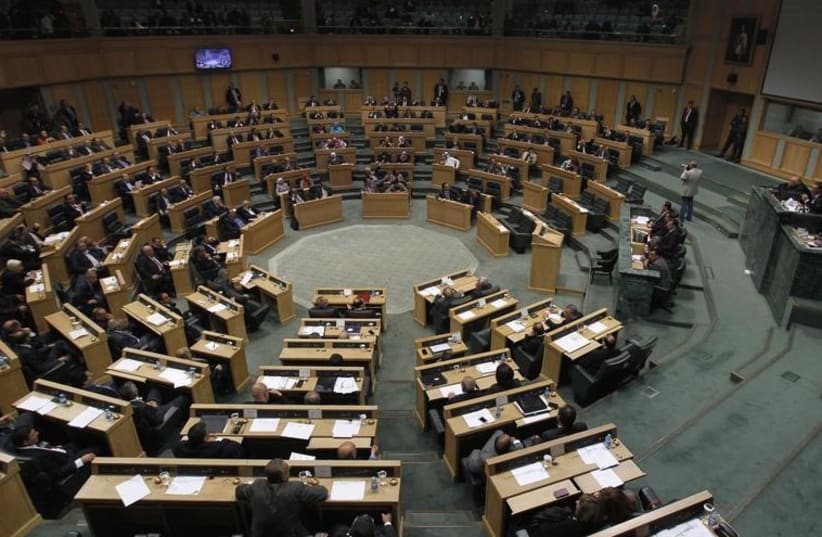The results of this week’s Jordanian parliamentary vote announced on Wednesday were disappointing for advocates of gender equality, as only 15 women were elected to the 130-deputy House of Representatives, down from 20 in the outgoing body.
There were 360 women among the 1,674 registered candidates. Around 4.6 million Jordanians were eligible to vote.
There were immediate calls to increase the number of seats reserved for female representatives in the lower house from the current 15, or one per governorate, to 23, or one per electoral district.
The Senate, or upper house, has 65 members, all of whom are directly appointed by the king.
During the previous election in 2016, five women managed to enter parliament by competing for seats outside the quota system.
Salma Nims, secretary-general of the Jordanian National Commission for Women, told The Media Line that no women were able to win open seats this time, which left them with the 15 seats guaranteed by the quota.
“On the Jordanian political scene, increasing women’s representation isn’t a priority,” she claimed.
Nims highlights that since 2016, women have been demanding an increase in parliamentary seats to one for each electoral district, “especially since Amman, Irbid and Zarqa are big governorates, where one seat for women from each isn’t enough.”
She cites political reasons as being behind this unmet demand.
“If this demand and call were met, Jordanian women would have achieved 23 seats instead of 15, and that would make a big difference in terms of women’s representation, as well as in diversity of representation,” she said.
Jordan’s House of Representatives is elected through a system of open listed, proportional representation, which allows multiple candidate lists to compete for votes. Twenty-three electoral districts divided into 15 governorates and other areas of the kingdom elect 130 deputies.
There are seats reserved for Christians (nine), Circassians (three) and Chechens (three), in addition to the 15 for women.
As for female cabinet ministers, Nims says that one or two are usually appointed, with the exception being the recent government of prime minister Omar Razzaz, who served from June 14, 2018, to October 12, 2020, and appointed seven women as ministers, the most to date.
“The decision-makers do the minimum to show that they support women’s representation in decision-making positions, but it is not enough,” she elaborated.
Jordanians headed to the polls on Tuesday even though the Hashemite Kingdom has been experiencing an unprecedented jump in coronavirus infections, with as many as 3,000 persons coming down with the virus each day. Accordingly, a four-day lockdown started an hour after the election results were announced.
The quota system, adopted in Jordan in 2001, has helped some women enter parliament, but the political role of Jordanian women is still limited although they constitute about 52% of voters.
Esraa Mahadin, a Jordanian lawyer and women’s rights activist who works as a master lead trainer at UN Women Jordan, the country office of the United Nations Entity for Gender Equality and the Empowerment of Women, told The Media Line that even if the calls to increase the 15 seats to one seat for each electoral district were accepted, it would be insufficient.
“Even if we achieve this, it’s not enough,” Mahadin said. “We should have a different goal. It’s not worth starting the battle with the government to increase representation by just eight seats.”
She clarifies that the election law was supposed to be amended at the beginning of the year, ahead of the election, but due to the pandemic and the subsequent lockdown, the existing legislation was used, so that for the first time since 1989, two parliaments were elected under the same law.
“Therefore, not a single part of the law was changed to focus on female representation and its quota,” Mahadin said.
She adds that the mechanism for formulating feminist demands needs to be reconsidered due to the repeated failure to secure acceptance.
“Women aren’t appointed to important portfolios, not in the parliament and not in the cabinet. Instead, they get ‘soft portfolios’ such as [head of] the Family Committee or the Women’s Committee,” she noted.
Jordan is in 12th place among Arab states in terms of women’s representation.
Prof. Hasan AlMomani of the University of Jordan’s Political Science and International Studies Department, stressed to The Media Line that female representation in parliament had not improved despite the importance of the matter.
“The quota system was put in place to protect women’s roles and representation, but unfortunately it isn’t enough,” he stated.
He added that in a normal democratic situation, competition between men and women should be based on qualifications and merit, but historically, women have been underrepresented, and the quota system was invented to help address that problem.
The parliamentary election was a constitutional requirement. Therefore, there was no choice but to hold it on the scheduled date despite the pandemic and resulting financial difficulties, AlMomani explained.
“Supposedly, the parliament represents the legislative authority, and constitutionally, it has huge weight. But in the political reality, the quality of the parliaments has varied, as there were strong councils and weak ones,” he explained.
This has gradually caused a loss of confidence in parliament, which, along with the novel coronavirus, was cited as explaining the poor voter turnout of 29.88% (1,387,698 people), the lowest in a decade.
“But I believe this came as a reaction by the citizens to the negative performance of previous councils,” AlMomani said.
